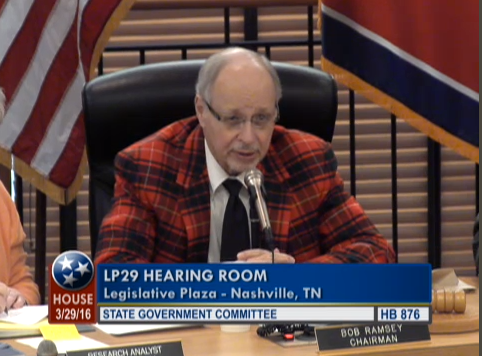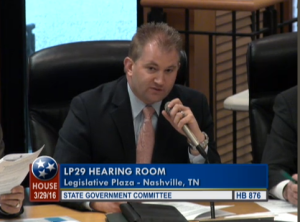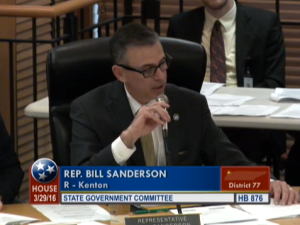Watch the video, read excerpts, from House Committee meeting on body cam video
Discussion by members of the House State Government Committee about body cam video legislation that would close access to records mostly centered on how best to avoid advancing the bill and instead request that the Advisory Committee on Open Government study the issue.
See video: House Committee discusses body cam legislation.
The committee clearly expressed that it did not want to move forward with a bill, with state Rep. Bill Sanderson, R-Kenton, stripping down his amendment to the part requiring a study and recommendation from the advisory committee, and state Rep. William Lamberth, R-Cottontown, at one point saying that passing any bill, even amended, “sends the wrong message.”
“I’m not voting for this bill in this format, period. It sends the wrong message. I think it is too quick. I would like to see some sort of study before we vote on a bill of this nature, even as amended. I feel like a motion to send this to ACOG would have the same effect,” Lamberth said.
The Advisory Committee on Open Government is a 14-member committee appointed by Comptroller Justin P. Wilson with an additional three ex-officio members representing a broad and diverse group of statewide civic organizations, government entities and media. (See who is on the committee.) The group was established by legislation in 2008 and has advised the Office of Open Records Counsel, which is within the Comptroller’s office, in developing a Schedule of Reasonable Charges for copies of public records. The committee is also authorized by law, with the guidance and assistance of the office of open records counsel, to “review and provide written comments on any proposed legislation regarding the open meetings laws compiled in chapter 44 of this title and the open records laws compiled in title 10, chapter 7.”
Last year, the Office of Open Records Counsel offered, with help from the Advisory Committee on Open Government, to conduct a study of proposed legislation that would have created new fees to inspect public records. The Open Records Counsel held three public hearings around the state, and produced a study that was delivered to the General Assembly earlier this year.
Comments from members of House State Government Committee made clear they wanted a study on the issue by ACOG and not last-minute legislation. State Rep. Curry Todd, R-Collierville, said he wanted to make sure that the sheriff’s and police chief’s association were involved in discussion. (Both the Tennessee Association of Chiefs of Police and the Tennessee Sheriff’s Association have representatives on the Advisory Committee.)
“It’s a conversation that must be had,” Lamberth said. “This age that we live in, it’s a digital age. We’re not talking about patrol cars with a VCR in the trunk where you have a videotape. This is information that needs to be preserved. And accountability without transparency is worthless. So if you’re going to have video cameras on officers, if you’re going to have video cameras in patrol cars, if you’re going to have video cameras on traffic lights and telephone poles, I for one am very concerned about not only the transparency aspects about that to make sure those videos are always accessible to the public except in extraordinary limited circumstances that we would all agree are necessary to shield certain victims of violent crimes or in other circumstances where privacy issues are concerned. But that we should always focus on that transparency. I join my colleague from Memphis in saying that law enforcement must be at the table on this because they are the ones that will have to implement anything we pass down here.”
State Rep. Johnny Shaw, D-Bolivar, said he wanted to make sure that nothing in the bill became a law until they got to vote again. He said he wanted the issue to go to ACOG, but did not want the bill to pass, and made a motion to do that.
Sanderson asked about the effect of not passing a bill that required a study from ACOG.
Ramsey, who is on the committee as an ex-officio member, said he had confidence that ACOG would deal with the issue, if asked, but was open to the will of the committee in how they asked.
“Personally, seeing the dedication that ACOG gave to the fee question, which absolutely changed the legislative approach, I don’t doubt that they will adequately discuss this,” Ramsey said.
Lamberth added that “I don’t think any of these organizations that review these bills that we have sent prior have turned us down yet. There’s no indication that these folks are reluctant to deal with this issue. They understand it’s a big issue. The Comptroller is voted on by all of here who are members. Again, the Comptroller has been very good in looking at issues as part of the legislative branch.”
Todd, R-Collierville, asked that the committee report back on Jan. 1.
The committee in the end voted to ask ACOG to consider the amendments. “We’ll be sending this to ACOG with all the trust they will take care of it and we’ll have a concrete bill next year.”
Related:
TCOG statement: TCOG opposes closing access to body camera footage related to police use of force
Knoxville News Sentinel: Bill would black out police body cam videos in Tennessee
Associated Press: Tennessee legislation would seal body cam footage
Bristol Herald Courier editorial: Lawmakers should vote no on HB876
Commercial Appeal editorial: Bill to delay release of video from police body cameras nullifies rationale for their use
The Tennessean: Attempt to seal body cam footage fails







